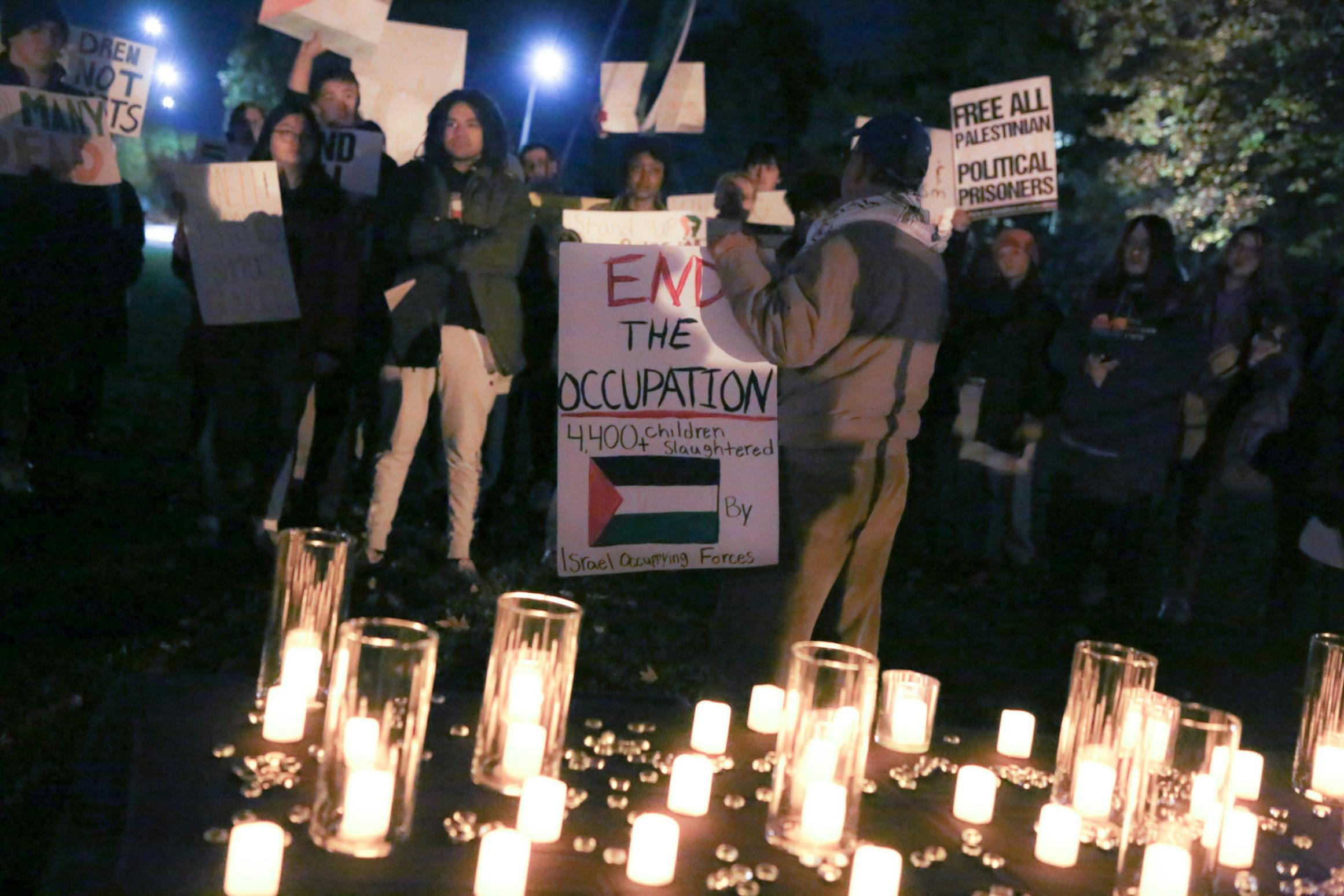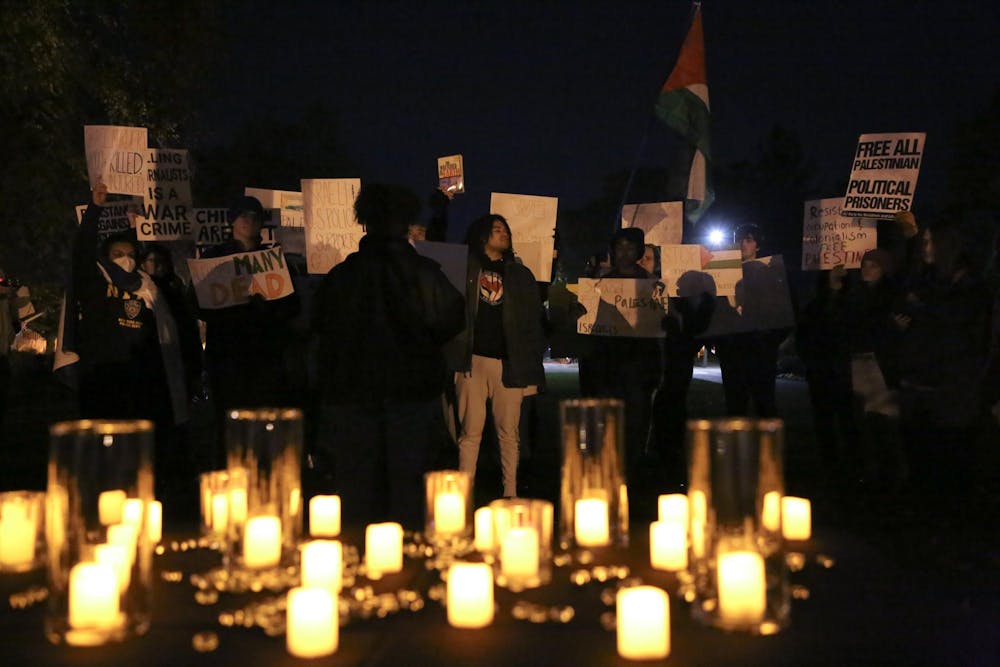Editor's Note: This story has been updated to reflect a clarification in a sources prefered name.
Students on campus who are of Jewish or Muslim background have received content through social media as a result of misinformation, with the frequency of this content having increased since the start of the Israel-Hamas war Oct. 7, 2023.
Alanna Willenson, a first-year vocal performance major and Jewish student, described her own experience in viewing antisemitism and Islamophobia as a result of misinformation from social media.
“Misinformation, especially regarding this war, has spread like a wildfire and I have seen too many students, many of which I know personally, [at] Ball State post things without fact-checking or coming to their own conclusions,” she said.
Eyal Rawitz, a Ball State men’s volleyball player from Tel Aviv, Israel, said the content tends to be more subtle than hate speech.
“I have definitely seen both on social media, mainly on Instagram. I would say it is more memes than outright hate speech or calling for it toward Jews and Muslims, some of which I saw from students on campus,” Rawitz said.
At a peace vigil held by the Office of Inclusive Excellence and the Ball State Center for Peace and Conflict Studies Nov. 1, 2023, Willenson expressed that the peace vigil was a moment of peace in the middle of “hate and disregard for the sanctity of life.”
“I don't think [the peace vigil] will ever disregard what's happening on the Gaza Strip, because that is so completely brutal, but there were a few people that took many liberties on Jewish stereotypes,” Rose said.
Beyond seeing posts online, Rose said she has experienced passive looks and scowls when wearing jewelry related to her Jewish background and identity.
Kaleb (Kalev) Antonacci, a second-year public history major and Jewish student, said his experiences with antisemitism on campus stem from the controversial social media app, YikYak, where college students can create and post discussion threads anonymously within close proximity.
“When the Vigil for Peace on Nov. 1, 2023 happened, I saw comments such as ‘All Jews hate other people, but nobody hates Jews,’ which I was shocked to see,” Antonacci said.
Social media is shown to be a tool that can target Jews with anti-semitism through the use of posts that can contain jokes, insults, and threats. Amber Maze, senior associate of the Indianapolis Jewish Relations Council, said social media can be used both for better or for worse in terms of antisemitism.
“Hatred against Jews and Muslims has skyrocketed in the past four weeks on social media, and that is deplorable,” Maze said. “Social media allows all of us to stay connected and informed, but it also provides a platform for people to say things in a feeling of anonymity. The Jewish community as a whole has felt even if they haven't been directly targeted, [they] feel on alert.”
While there has been a steady increase over the last five to 10 years, Maze said there has been a spike in the last couple of months. In October, a 21-year-old student at Cornell University was charged by federal prosecutors for allegedly posting online threats on social media in which it stated he wanted to cause harm to Jewish students.
Bido Omar, a second-year pre-med major and Muslim student at Ball State, said the recent spike of antisemitism has spread alongside Islamophobia through the use of social media in a much more subtle manner.
“People have told me, ‘Be careful, people might start getting violent,’ but I don't think that was so much a threat. Nothing serious in person,” Omar said. “But through social media, I would just see bits and pieces of misinformation, to the point that it brings out some sort of Islamophobia such as giving the narrative that most of the people in Gaza are terrorists, which is not true.”
Matthew Hotham, assistant professor of religious studies at Ball State who researches Islamophobia, said much of it happens privately.
“Social media does play a role in that and this is part of my research,” Hotham said. “ There are right-wing white supremacist groups who, in part, prove their ‘American-ness’ through dunking on religious and racial minorities, and Muslims are one group that they target.”
Hotham added that this forms confusion among viewers of social media who are uninformed on conflicts that would have some correlation with Islam based on the content of a certain group.
“They are anticipating an uninformed, broader audience who will overreact to the things that they make up if they distribute them correctly,” he said. “A lot of Islamophobic discourse sort of follows that and tends to… fabricate a controversy, get non-Muslim people to overreact to a made-up controversy.”
According to the Council on American-Islamic Relations, there has been an increase in reports relating to Islamophobia. The Council received a total of 1,283 requests for help as well as reports of bias in the weeks of Oct. 7, 2023 to Nov. 4, 2023, a 216 percent increase in reports since last year.
“For me, Islamophobia is anger. Hatred, resentment towards people who you think might be Muslim, and so it doesn't have much to do with fear, and it doesn't have much to do with the religion itself,” Hotham said.

Another consequence of social media is the tunnel of disinformation that opens. This allows users to know what antisemitism is and what the difference is between its close association with other forms of prejudice towards Jews.
Brent Blackwell, associate teaching professor of English and Holocaust scholar at Ball State, determined social media causes mass confusion between anti-semitism and its relationship to Israel.
“What happens so many times on social media is people are accused of being antisemitic when they're anti-Israeli, and those are those are two different things,” Blackwell said. Blackwell defines antisemitism as hostility toward the Jewish people compared to anti-Israelism, which he described as a disagreement of the policies of the Israeli government.
According to the Anti-Defamation League (ADL), there has been an increase in the number of reported incidents of antisemitism by nearly 400 percent since Oct. 7, 2023.
Trent Spoolstra, associate regional director for the ADL Midwest, explained that the incidents can consist of vandalism, assault and taunting.
“There are people, especially on the far left of the political spectrum, who view it simply as a fight of good and evil, but a lot of folks on college campuses don’t recognize that Hamas is a terrorist organization,” Spoolstra said.
College campuses, in particular, have seen a rise in antisemitism that corresponds with the rest of the country.
“For instance, looking at Butler, Ball State, [or] IU where protests against Israel we believe have exceeded what's considered fair,” Spoolstra said.
Fatima Hussain, board member of the Muslim Alliance of Indiana, described their reports of Islamophobia in college campuses in Indiana, including Ball State, as attributed to discrimination of their use of religious garments as well as their right to speak out.
“Generally speaking, students wearing hijabs or keffiyehs in public or speaking their minds online feel unsafe, and many don’t feel supported by their academic institutions,” Hussain said.
Dr. Yusuf Bahrami, a physician and spokesperson for the Islamic Center of Muncie said attendees who are women have reported they are most vulnerable when it comes to Islamophobia on social media.
“When it comes to women that wear the hijab, people would make comments like, ‘Go back to your country,’ or those kinds of derogatory comments on Facebook or Instagram if they’re commenting about the conflict and are seen wearing it online,” Bahrami said.
There is also a political element when it comes to the rise of Islamophobia and antisemitism that has a correlation within the spectrum of American politics that is noticeably intensified from the start of the conflict.
Hussain said due to college campuses across the state putting out weak statements condemning the violence, Muslim and Jewish students do not have much faith in the leadership of these campuses.
“A lot of students are feeling like many administrators at college campuses are not taking the rise of antisemitism and Islamophobia seriously, including Ball State,” Hussain said.
Students at Ball State who have experienced identity-based hate on campus can fill out a bias incident report through the Multicultural Center.
Contact Jose Padilla with comments at JPadilla4@bsu.edu.





